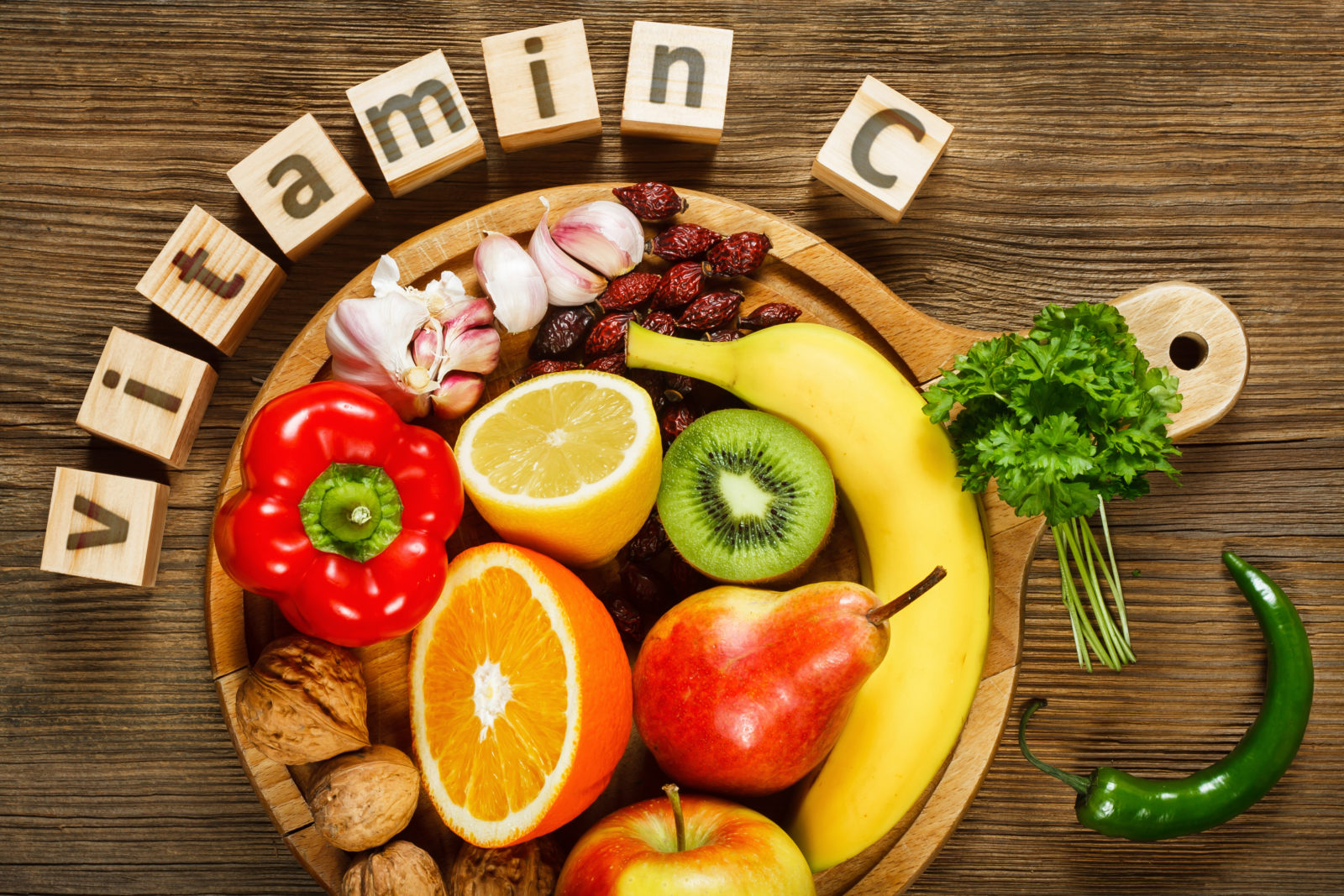Vitamin C – also known as ascorbic acid – is an essential vitamin that is not naturally produced within the human body, so it must be consumed through food or dietary supplements. It has strong antioxidant properties that help reduce the risk of chronic diseases, including but not limited to, cataracts, cavities, constipation, Lyme disease, asthma, and age-related vision loss. Vitamin C also helps reduce the risk of heart disease and helps develop blood vessels. Common foods that contain vitamin C are berries, citrus fruits, tomatoes, and cabbage. Vitamin C is required for the proper functioning and development of many organs in the body.
What Is Vitamin C
One may associate Vitamin C with Scurvy – the explorer disease. Though a very rare disease today it was once very prevalent being mentioned as late as 1550 BC in Thebes, Egypt as well as by Hippocrates around 400 BC who described how soldiers suffered from the disease.
Vitamin C is a small, simple molecule made of 6 carbon, 6 oxygen, and 8 hydrogen atoms – which together bonded form the molecule ascorbic acid or Vitamin C.
Although the cure for scurvy was positively proved by James Lind in 1747, it was in 1932 that the molecule was isolated from lemons. This isolation would prove to be a wonderful discovery as it would have enormously positive effects on diseases in the body.
Found mainly in plants, though there are small amounts in raw fish, the quantity and quality of Vitamin C degrades with cooking, heat and prolonged storage as well as exposure to oxygen. Though water-soluble, meaning it leaves the body after it is used, some organs in the body do store a minute amount of the vitamin including the adrenal glands, pituitary, the eyes, and the brain as well as the reproductive organs.

Actions of Ascorbic Acid
In the body, Vitamin C acts as a reducing, oxidizing, anti-clotting, anti-infection and antihistamine agent.
Other roles and actions of Vitamin C in the body include the following:
- antiviral
- antibacterial
- anti mold/antifungal
- anti-inflammatory
- formation of collagen
- important for detoxification
- antioxidant and increase glutathione production
- supports adrenal to help improve stress response.
Main functions of Vitamin C
- Antioxidant: if all other antioxidants leave the body it will act as one
- Detoxification: reduces the side effects of certain drugs. Detoxing pollutants and protecting against cancer and heart disease.
- Immune System: stimulates the immune function – combat off free radical damage, anti-cancerous support, and virus destruction.
- Antihistamine: reducing inflammation throughout the body. Vitamin C does wonders for the brain and spinal cord – leaving a positive effect on both resulting in a healthier/stronger and more flexible spinal cord.
- Collagen: formation and maintenance of collagen and basic of connective tissue, bones to keep bones, skin, and joints firm and skin supple. Maintaining the integrity of the skin. The formation of collagen is needed to help keep the protective membrane surrounding the baby strong.
Vitamin C Benefits
Vitamin C is needed for numerous actions and functions within the human body, when we are ill, feeling unwell or in a state of unease the supplementation of vitamin C can make a world of difference. Vitamin C strengthens the immune system, revitalizing organs, invigorating the adrenal glands and balancing hormonal production.
Vitamin C aids in the development and function of neurotransmitters, thus positively enhancing the behavior and working of the brain as well as the entire operation of the body. It has been shown to reduce the symptoms of depression, schizophrenia and other mental illnesses. Individuals who are schizophrenic metabolize approximately 10x as much vitamin C than the average person, therefore it is beneficial – under the supervision of a specialist – to supplement them with a far higher dosage to obtain benefits (10x as much is recommended).
Vitamin C and Arthritis
Joint pain can be attributed to many things, a highly acidic body, lack of nutrients, calcification and autoimmune diseases. Rheumatoid arthritis is one such arthritic condition that is a result of an autoimmune disease. It involves the immune system slowly eating away at the connective tissue of the joints and leading the individual in pain, discomfort, swelling and a loss of mobility.
An autoimmune disease involves the immune system attacking its cells, and thought western medicine may not have a cure yet, alternative and functional medicine looks at the body and where something went wrong, and conclude that there is a strong correlation between various autoimmune diseases and digestive health. Often, healing the digestive lining and the brain can provide the best relief.
Vitamin C can also be very beneficial in combating rheumatoid arthritis. Vitamin C is an essential nutrient in the building of collagen, which is necessary for the development of connective tissue. Vitamin C also aids in reducing inflammation, turning an acidic environment into an alkaline one and aids in the prevention of pain and swelling.
Vitamin C and Cervical Dysplasia
Studies have shown that women who consume high levels of Vitamin C containing foods, as well as supplement with ascorbic acid, have normal Pap smear results, then women how consumed far less vitamin C (in food or supplements) who were shown to have a range mild cervical inflammation to cancer development. The immune system plays a big part in how well your vagina is working. When it is impaired it is far more susceptible to infection and inflammation. Vitamin C has also been shown to prevent the development of nitrosamines, a substance that forms in the body from the interaction of the food additive nitrite and chemicals that the body naturally produces. Nitrosamine has been shown to aid in the development of cancer, making it a carcinogenic (cancer-causing) agent. 1000mg of Vitamin C daily (ascorbic acid) is beneficial in preventing this in some individuals. I, however, would recommend increasing the dosage slowly if you have a low immune system, are sick or have a great deal of stress in your life.
However, one’s immunity is not the only factor in a healthy vaginal and cervix environment. To learn more about what you can do check out our page on preventing Vaginal Yeast Infections, we delve into how to maintain a healthy and clean environment in your vagina.
Vitamin C and Mental Health
Research has shown low levels of Vitamin C (as well as low levels of Vitamin B1 and Vitamin B2) can result in developmental problems. This includes hypochondria, depression, hysteria even psychopathic abnormalities. These issues often all disappear when an adequate dosage of the missing nutrients are added back into the diet through food or supplementation. High doses of Vitamin C have also been shown to be beneficial in treating some forms of schizophrenia and supplementing with Vitamin C while taking the drug haloperidol reduces motor response triggers in the brain, which aids in the reduction of symptoms of schizophrenia as well as paranoid psychosis.

Vitamin C Deficiency
When one is low in Vitamin C they may feel as if they had a lack of energy, experience inflammation of their gums, tooth decay and have issues with bleeding (apart from the menstrual cycle). When one is moderately low in Vitamin C they will often experience such issues;
- Poor resistance to infections
- poor digestion
- little to no appetite
- impaired wound healing
- general weakness
- skin bruises easily, black and blue marks, broken capillaries, hemorrhages, pink spots on the skin, nosebleeds
- ruptured blood vessels in the eye
When one has a high rate of deficiency in Vitamin C they will often experience symptoms of scurvy. In the 1500s when ship voyages increased in duration sailors began to experience a high rate of vitamin C deficiency in the form of scurvy – not only were their teeth falling out but many of their old wounds began to reappear, whether it be broken bones that had healed braking spontaneously or deep cuts that had healed years ago reopening and bleeding profusely.
Although scurvy is rare today it does still occur, though it is often not recognized by physicians. It occurs most often in individuals who consume low levels of fresh fruits and vegetables as well as individuals who are under constant high stress. Examples of symptoms include swelling of the body and limbs, pain in the joints, easy bruising, bleeding gum disease, and wiry hair. It is important to pay attention to your body and how you are feeling. As David Ostreicher D.D.S. Professor of Nutrition at Bridgeport University in Connecticut stated, ” If you’re not getting enough Vitamin A and C, you might not know until 20 years later when you develop cancer. ” (ed. Faelten, S., 1988, page 24).
A very bad deficiency in Vitamin C will exhibit the following effect on the body;
- Bleeding from the nose
- painful bleeding gums
- ulcers in the mouth
- blood in stool
- wiry hair
- shortness and or trouble breathing
- anemia
- swelling and/or tenderness of joints (leading to severe pain)
- teeth become very loose
- weak nails
- thinning or premature aging of the skin
Age, gender and lifestyle choices all influence the amount of Vitamin C that one will need to consume. Small growing children, just like adults can also experience deficiencies in Vitamin C, which will result in reduced growth as well as fragile bones and joints and poor development of gums and teeth. Mothers who breastfeed their children need to think of both themselves and the child and supplement with vitamin C several times a day to provide herself and her child with adequate amounts of the vitamin.
Elderly individuals are another group of people that need to make sure that they get enough of the vitamin. With age, the ability for the digestive tract to absorb and utilize nutrients strongly diminishes, therefore supplementing with Vitamin C orally or if available intravenously can be incredibly beneficial. Elderly individuals will experience symptoms of vitamin c deficiency by an increase in the bleeding of their capillary walls, clotting and an increase in the risk of heart attacks and strokes.

Dosage – Recommended daily intake of Vitamin C
Though Vitamin C is found in raw fruits, vegetables, and fish, it is when high doses of Vitamin C are taken that it works like a flash oxidizer on the body resulting in the neutralization of toxins, histamine (inflammation) and viruses – eliminating them in minutes (though some conditions may require for more time).
Vitamin C is water-soluble so it is used up by the body quickly, within a 2-hour time frame to be exact and cleared from the blood within 3-4 hours. This is the regular utilization and release of vitamin C by the body, however, when the body is ill or under stress it comes about far faster. During stressful times, Vitamin C can be flushed from the body every hour and a half, sometimes even sooner.
It is, therefore, best to take Vitamin C daily every four hours instead of taking one dosage all at once. Though Vitamin C is not toxic the body does have a bowel tolerance for it – if you take your bowel tolerance you will be in the washroom emptying your bowels. Beginning with 500 -1000mg at a time is a good amount. After a week you can slowly increase your dosage, all the time paying not to the positive changes that your body goes through.
When you are sick, feeling ill, experiencing a headache, taking 500-1000mg of Vitamin C every hour will help your body fight off the infection. Doing this on the day you feel ill will make you feel wonderfully better the following day.
Vitamin C and Lecithin is taken together intravenously at a 20,000 -30,000mg will go directly through the membrane and into the cells of the body. 35-40 g (even at 20 g) of Vitamin works like a pro-oxidant — cancer cannot exist is an oxidized state/alkaline one as well.
Too Much Vitamin C?
There are a few contraindications of Vitamin C, however, apart from these few issues, it is not toxic. If an individual has either of the issues below or feels uncertain it is best to speak and work with a registered health professional.
Contraindications
Diabetics should use Vitamin C only under the supervision of a medical practitioner – affects blood -sugar levels
Poor kidney function can make it troublesome to take high doses of Vitamin C and individuals with less than 30% of their kidneys functioning should be instructed by a physician.

Vitamin C Foods
Though these foods may not have been known to have Vitamin C in them, they are historical goods that were marveled for their wonderful benefits in combating the effects of Vitamin C deficiency in the body. They include; limes, acerola cherries, rosehip powder, and spruce needles – though they could all be consumed as the food they were often taken as a tea.
Best Food Sources of Vitamin C
Vitamin C Fruits: Citrus fruits, rosehips, acerola cherries, strawberries, kiwi, melons, tomatoes, papaya, black raspberries
Vitamin C Vegetables: red and green bell peppers, broccoli, brussels sprouts, asparagus, parsley, dark leafy greens, cabbage, watercress, cauliflower, peas, sprouts, and microgreens.
Fish can be a source of Vitamin C but it needs to be eaten raw!
Note: Vitamin C depleted by cooking and storage

Supplement Forms of Vitamin C
Vitamin C or ascorbic acid is easily absorbed by the digestive tract, which processes between 80-90% of the ingested vitamin. Vitamin C can be mildly acidic in the GI tract in large doses (5000 mg +) so an Ester C with bioflavonoids (SISU brand) or an ascorbate form (ex. Calcium or magnesium ascorbate) are mildly alkaline and more easily tolerated. Individuals who suffer from acid reflux and heartburn will find these forms more tolerable.
When choosing a vitamin C to supplement with make sure that it is not made of corn syrup – which will often be labeled as Maltodextrin. Supplement forms of Vitamin C are mainly derived from citrus fruit, however, sometimes they can also be extracted from corn syrup (due to it being more cost-effective).
Best time to take Vitamin C supplements
It is best to supplement with Vitamin C at four-hour intervals throughout the day when one using the vitamin to maintain good health. If one is sick or not feeling their best it is best to supplement it every hour or every two hours.
General Maintenance = 1 500mg or 1000mg capsule every 4 hours
Sick / Stressed / Fatigue = 1 500 or 1000 mg capsule every 1-2 hours

References
Carpenter, K.J., (1986). The History of Scurvy and Vitamin C. New York; Cambridge University Press.
Davis, M.B., Partridge, D.A., Austin, J.A. (1991). Vitamin C: Its Chemistry and Biochemistry. Cambridge; The Royal Society of Chemistry.
ed. Faelten, S. (1988). The Complete Book of Vitamins and Minerals for Health. Rodale; Pennsylvania.
Haas, E.M., & Levin, B. (2006). Staying Healthy with Nutrition. USA; Celestial Arts.
Hickey, S & Saul, A.W. (2008). Vitamin C: The Real Story. California; Basic Health Publications.
Holford, P. (2007). Optimum Nutrition for the Mind. Great Britain; Piatkus.
McDowell, L. (2013). Vitamin History, the Early Years. USA; University of Florida.
Amanda Filipowicz is a certified nutritional practitioner (CNP) with a bachelor in environmental studies (BES) from York University. She also has certification in clinical detoxification, prenatal and postnatal care as well as nutrition for mental health. She has been working as a nutritionist since 2013 and is a lifelong proponent of eating healthy.

